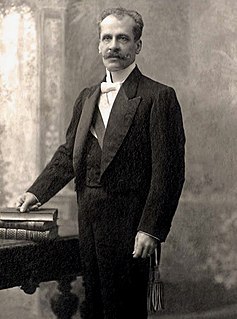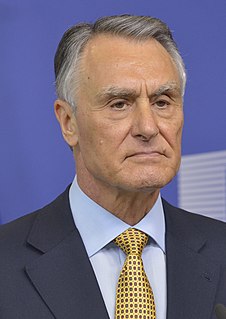
Politics in Portugal operates as a unitary multi-party semi-presidential representative democratic republic, whereby the Prime Minister of Portugal is the head of government, and the President of Portugal is the non-executive head of state with several significant political powers they exercise often. Executive power is exercised by the Government, whose leader is the Prime Minister. Legislative power is primarily vested in the Assembly of the Republic, although the government is also able to legislate on certain matters. The Judiciary of Portugal is independent of the executive and the legislature. The President exerts a sort of "moderating power", not easily classified into any of the traditional three branches of government.

The Spanish Socialist Workers' Party is a social-democratic political party in Spain. The PSOE has been in government longer than any other political party in modern democratic Spain, namely from 1982 to 1996 under Felipe González; from 2004 to 2011 under José Luis Rodríguez Zapatero; and currently since 2018 under Pedro Sánchez.

The Social Democratic Party is a liberal-conservative political party in Portugal. Commonly known by its colloquial initials PSD, on ballot papers its initials appear as its official form PPD/PSD, with the first three letters coming from the party's original name, the Democratic Peoples' Party. A party of the centre-right, the PSD is one of the two major parties in Portuguese politics, its rival being the Socialist Party (PS) on the centre-left.

Francisco Álvarez–Cascos Fernández is a Spanish politician. He was Secretary-General of the ruling Partido Popular from 1989 to 1999 and the President of the Principality of Asturias from 2011 to 2012.

Manuel González de Candamo e Iriarte served as the 33rd President of Peru from 1903 until his death in 1904. He also served as Interim President of Peru, officially as the President of the Government Junta, from 8 September 1903 until his death the following year.

The 2001 Portuguese presidential election was held on 14 January.

The 2006 Portuguese presidential election was held on 22 January to elect a successor to the incumbent President Jorge Sampaio, who was term-limited from running for a third consecutive term by the Constitution of Portugal. The result was a victory in the first round for Aníbal Cavaco Silva of the Social Democratic Party candidate, the former Prime Minister, won 50.54 percent of the vote in the first round, just over the majority required to avoid a runoff election. It was the first time in which a right-wing candidate was elected President of the Republic since the 1974 Carnation Revolution.

Joaquim Fernando Nogueira, commonly known just as Fernando Nogueira, is a Portuguese lawyer and former politician.
The Democratic Renewal Party was a political party in Portugal, founded in 1985 with the political support of the then independent President of the Republic, Ramalho Eanes, and lasting until 2000. At the time of its foundation, it was meant to "moralize Portuguese political life" and the party positioned itself in the political centre. Its first leader was Hermínio Martinho.

The president of the Principality of Asturias is the head of government of the Spanish autonomous community of Asturias. The president is chosen by the General Junta of the Principality of Asturias, autonomous parliamentary institution.

The Third Portuguese Republic is a period in the history of Portugal corresponding to the current democratic regime installed after the Carnation Revolution of 25 April 1974, that put an end to the paternal autocratic regime of Estado Novo of António de Oliveira Salazar and Marcello Caetano. It was initially characterized by constant instability and was threatened by the possibility of a civil war during the early post-revolutionary years. A new constitution was drafted, censorship was prohibited, free speech declared, political prisoners were released and major Estado Novo institutions were closed. Eventually the country granted independence to its African colonies and begun a process of democratization that led to the accession of Portugal to the EEC in 1986.

Aníbal António Cavaco Silva, GCC, GColL is a Portuguese economist who served as the 19th president of Portugal, in office from 9 March 2006 to 9 March 2016. He had been previously prime minister of Portugal from 6 November 1985 to 28 October 1995. His 10-year tenure was the longest of any prime minister since António de Oliveira Salazar, and he was the first Portuguese prime minister to win an absolute parliamentary majority under the current constitutional system. He is best known for leading Portugal into the European Union.

Pedro de Silva Cienfuegos-Jovellanos is a Spanish politician, lawyer and writer. He served as the second President of the Principality of Asturias from 17 June 1983, until 10 July 1991.

Javier Fernández Fernández is a Spanish politician, mining engineer, and civil servant. He was the secretary general of the Federación Socialista Asturiana, the regional socialist party affiliated with the national Spanish Socialist Workers' Party (PSOE).

Sergio Marqués Fernández was a Spanish politician and lawyer. Marques served as the President of the Principality of Asturias from 1995 to 1999. He is the only member of the People's Party (PP) to have held the presidency of Asturias to date. In 1999, Marques founded Unión Renovadora Asturiana (URAS), a regional political party based in Asturias.

The 1983 Asturian regional election was held on Sunday, 8 May 1983, to elect the 1st General Junta of the Principality of Asturias. All 45 seats in the General Junta were up for election. The election was held simultaneously with regional elections in twelve other autonomous communities and local elections all throughout Spain.

The 1987 Asturian regional election was held on Wednesday, 10 June 1987, to elect the 2nd General Junta of the Principality of Asturias. All 45 seats in the General Junta were up for election. The election was held simultaneously with regional elections in twelve other autonomous communities and local elections all throughout Spain, as well as the 1987 European Parliament election.

The 1991 Asturian regional election was held on Sunday, 26 May 1991, to elect the 3rd General Junta of the Principality of Asturias. All 45 seats in the General Junta were up for election. The election was held simultaneously with regional elections in twelve other autonomous communities and local elections all throughout Spain.
José García González was a Spanish psychiatrist and neurologist known for having obtained political attributions in the Council of Government of the Principality of Asturias, along with the Spanish Socialist Workers' Party (PSOE).

The 2026 Portuguese presidential election will be held in January. This election will elect the successor of President Marcelo Rebelo de Sousa, as he is barred from running for a third term.
















